Sexploitation’s lasting effect: Part I
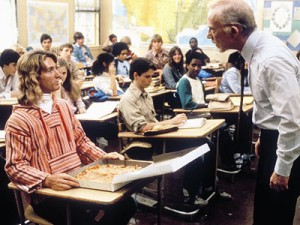 While Fast Times at Ridgemont High used the teen sexploitation genre a merely a jumping off point for its surprisingly insightful and realistic portrayal of high school life, delving into more taboo issues than most films of that era, there were other, more simplistic examples of the genre, like Losin’ It or Porky’s. Not all sexploitation movies should be discredited for their focus, there are films like Risky Business that successfully venture into satire or unbelievable sleaziness, like Hardbodies, or inept and hilarious idiocy, like They’re Playing With Fire, that stand the test of time for their own reasons.
While Fast Times at Ridgemont High used the teen sexploitation genre a merely a jumping off point for its surprisingly insightful and realistic portrayal of high school life, delving into more taboo issues than most films of that era, there were other, more simplistic examples of the genre, like Losin’ It or Porky’s. Not all sexploitation movies should be discredited for their focus, there are films like Risky Business that successfully venture into satire or unbelievable sleaziness, like Hardbodies, or inept and hilarious idiocy, like They’re Playing With Fire, that stand the test of time for their own reasons.
This is a series that will look at the more memorable examples of the genre, which may mean they are well known and/or have a large cult following, such as the example below, Valley Girl, or not so much, like Screwballs.
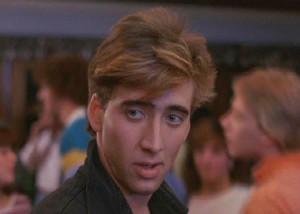 Valley Girl has been praised in the past for its authenticity with regards to teenagers in California in the early 1980’s, and for how apparently romantic and sweet the movie is, which was one of the major reasons it received a rather stacked special edition DVD a few years ago. That Nicolas Cage was the lead was certainly a factor, but my intention was to look at it without the societal or celebrity attachments. It is interesting to note that like with Fast Times, Valley Girl was directed by a woman (Martha Coolidge, Amy Heckerling directed Fast Times), which implies an extra level of sensitivity, despite the R rating. Seeing as the movie is mostly shown from the woman’s perspective, this would also suggest a new approach to these types of films, worrying about character development and insight, eschewing gimmicks.
Valley Girl has been praised in the past for its authenticity with regards to teenagers in California in the early 1980’s, and for how apparently romantic and sweet the movie is, which was one of the major reasons it received a rather stacked special edition DVD a few years ago. That Nicolas Cage was the lead was certainly a factor, but my intention was to look at it without the societal or celebrity attachments. It is interesting to note that like with Fast Times, Valley Girl was directed by a woman (Martha Coolidge, Amy Heckerling directed Fast Times), which implies an extra level of sensitivity, despite the R rating. Seeing as the movie is mostly shown from the woman’s perspective, this would also suggest a new approach to these types of films, worrying about character development and insight, eschewing gimmicks.
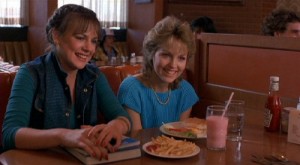 Forget it. The two “star crossed lovers” (Valley Girl is not subtle with its Romeo and Juliet reference, having the couple walking out of the 1968 version during a montage) are completely vapid and undeveloped, and I can hardly think of a less interesting female lead than Deborah Foreman. She’s like Olivia Newton-John without the energy. The movie is a dead zone practically the entire time, with nary any interesting or funny dialogue or amusingly raunchy material to distract you, horrific pacing, and each scene is so stale and yet impatient, as if you can feel Coolidge just tapping her foot waiting to call cut. Brainless girls sit around talking in valley talk (“fer sure” is thrown into every sentence) and concern themselves with popularity. It may be accurate, but it’s also boring. Nicolas Cage shows up initially at the beach and makes googly eyes at Foreman, and then eventually shows up at a party, uninvited, in pseudo-punk garb. Hence, he’s the outsider. They have nothing to say to each other, so they stare into each other’s eyes and then make out. This is the extent of their relationship, something characterized by Foreman as “amazing.” Then we sit through musical montages (one long one is luckily scored with Melt With You, which is also played over the closing credits) to show them enjoying each others company, but not once do we hear them really say anything. There are vague bits of social satire concerning health food (Foreman’s parents are hippies who run a restaurant for healthy cuisine, her dad is a dead ringer for Sonny Bono) but these elements are so dated as to be almost unintentionally funny, like something SNL would have parodied the notion of making fun of, in 1977.
Forget it. The two “star crossed lovers” (Valley Girl is not subtle with its Romeo and Juliet reference, having the couple walking out of the 1968 version during a montage) are completely vapid and undeveloped, and I can hardly think of a less interesting female lead than Deborah Foreman. She’s like Olivia Newton-John without the energy. The movie is a dead zone practically the entire time, with nary any interesting or funny dialogue or amusingly raunchy material to distract you, horrific pacing, and each scene is so stale and yet impatient, as if you can feel Coolidge just tapping her foot waiting to call cut. Brainless girls sit around talking in valley talk (“fer sure” is thrown into every sentence) and concern themselves with popularity. It may be accurate, but it’s also boring. Nicolas Cage shows up initially at the beach and makes googly eyes at Foreman, and then eventually shows up at a party, uninvited, in pseudo-punk garb. Hence, he’s the outsider. They have nothing to say to each other, so they stare into each other’s eyes and then make out. This is the extent of their relationship, something characterized by Foreman as “amazing.” Then we sit through musical montages (one long one is luckily scored with Melt With You, which is also played over the closing credits) to show them enjoying each others company, but not once do we hear them really say anything. There are vague bits of social satire concerning health food (Foreman’s parents are hippies who run a restaurant for healthy cuisine, her dad is a dead ringer for Sonny Bono) but these elements are so dated as to be almost unintentionally funny, like something SNL would have parodied the notion of making fun of, in 1977.
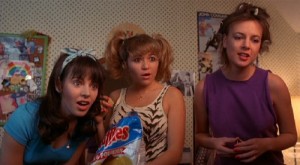 Things that were distracting: Dottie from Pee-Wee’s Big Adventure gets topless in the first twenty minutes. She plays one of Foreman’s friends. Try to watch Pee-Wee’s Big Adventure with the thought of innocence after that.
Things that were distracting: Dottie from Pee-Wee’s Big Adventure gets topless in the first twenty minutes. She plays one of Foreman’s friends. Try to watch Pee-Wee’s Big Adventure with the thought of innocence after that.
The first time I wasn’t depressed during Valley Girl, was when Foreman and Cage got in a car and they played Electric Avenue, as the previous music had been lifeless and dated early 80’s pop. Despite being set during high school, there are only one or two shots that take place at school, outside of the oddly and loosely directed prom scene (would they really have a punk band that plays the song Johnny, Are You Queer Boy? at a straightlaced school’s prom in the Valley?). Supposedly these are the popular kids, but we never see anyone else, so are we supposed to think they’re popular because the town is deserted, or perhaps they are just deluded and everyone avoids them? Foreman talks endlessly about her relationship and how she’s not sure about staying with Cage, because he’s an outsider, and all her friends think he’s bad for her for that reason. This takes up about 20-25 minutes of the movie, and Cage isn’t featured in any of it, which was an odd choice, as if he perhaps went on a vacation. The problem is that Foreman seems so stupid that I really didn’t care if she did stay with him, she seemed more suited to be with the dimbulb “hunk” who was in love with her and had been her previous beau. We’re supposed to see how much she’s changed because Cage has opened her up so much, but she seemed exactly the same throughout. This is one of the few times where I’ve felt that the main character was dead weight and should be excised from a movie.
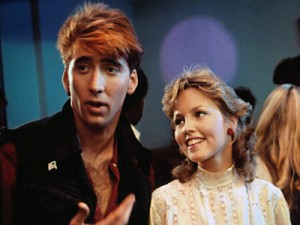 There’s a far more interesting subplot about a student who works as a grocery delivery boy, who has a crush on one of Foreman’s friend’s mothers, and vice versa. And there is a lot of set up for this to occur, and even intercutting between Foreman and her friends talking about Cage in his absence in truly uninteresting ways, while we wait to for the grocery guy to approach the naked body in the shower. But the filmmakers pull a bait and switch on us, and we feel cheated. They wussed out on what would have been considered at most, mildly taboo, by showing an older woman with a high school kid. The whole thing is then dropped anyway.
There’s a far more interesting subplot about a student who works as a grocery delivery boy, who has a crush on one of Foreman’s friend’s mothers, and vice versa. And there is a lot of set up for this to occur, and even intercutting between Foreman and her friends talking about Cage in his absence in truly uninteresting ways, while we wait to for the grocery guy to approach the naked body in the shower. But the filmmakers pull a bait and switch on us, and we feel cheated. They wussed out on what would have been considered at most, mildly taboo, by showing an older woman with a high school kid. The whole thing is then dropped anyway.
And then Cage is re-inserted into the movie to stalk Foreman, sleeping on her lawn, getting jobs in every place she goes (I hope these scenes weren’t intended to be believable), leaving his pictures in her textbooks. I thought it was bizarre and creepy, but Foreman seems to find this charmless behavior, cute. Eventually there is a fistfight at the prom which is poorly staged, and everyone at the prom just kind of passively watches and waits for the obvious conclusion.
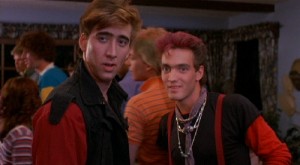 A lot of Valley Girl feels really slack and loose, as if the dialogue was all improvised (poorly), but most of it seems like an in-joke the director and cast were on it and didn’t feel like revealing. A perfect example is at the prom, when Cage and his friend are about to interrupt the crowning of the king and queen, and they look at each other and say, with simultaneous excitement, “let’s crush that fly!” Now this is the first reference to a fly, and we’re not even sure that Foreman is into Cage at this point, so I guess this is something that was funny on the set, or had more meaning before they cut the material that would explain it. The whole movie is like that.
A lot of Valley Girl feels really slack and loose, as if the dialogue was all improvised (poorly), but most of it seems like an in-joke the director and cast were on it and didn’t feel like revealing. A perfect example is at the prom, when Cage and his friend are about to interrupt the crowning of the king and queen, and they look at each other and say, with simultaneous excitement, “let’s crush that fly!” Now this is the first reference to a fly, and we’re not even sure that Foreman is into Cage at this point, so I guess this is something that was funny on the set, or had more meaning before they cut the material that would explain it. The whole movie is like that.
Fast Times at Ridgemont High showed many different sides of the student’s lives, examining the hierarchy of popularity and the different sub-cultures within the school and a full exploration of their home and work lives, somehow, all in the span of 90 minutes (Valley Girl is 99) and with far more characters. I have no idea why Valley Girl is so beloved, the dialogue is trite, the characters forgettable, and the plot is dull and obvious.



